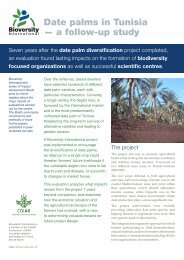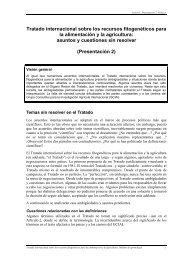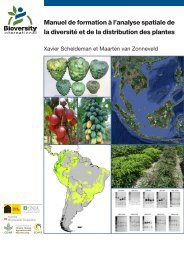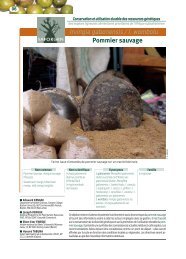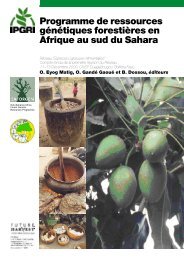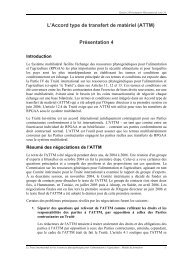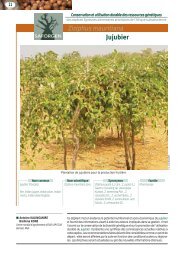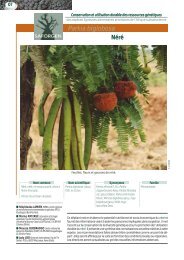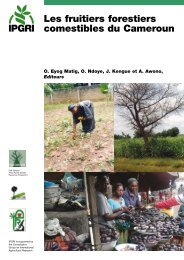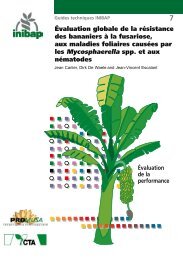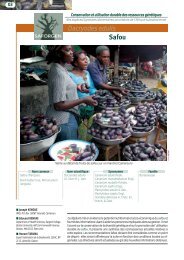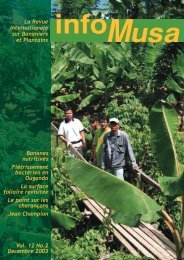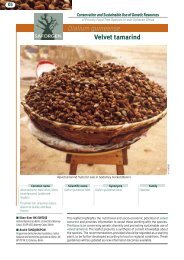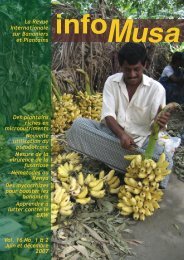Rocket: a Mediterranean crop for the world - Bioversity International
Rocket: a Mediterranean crop for the world - Bioversity International
Rocket: a Mediterranean crop for the world - Bioversity International
You also want an ePaper? Increase the reach of your titles
YUMPU automatically turns print PDFs into web optimized ePapers that Google loves.
2<br />
ROCKET GENETIC RESOURCES NETWORK<br />
4VIWIRX WXEXYW SJ VSGOIX KIRIXMG VIWSYVGIW ERH GSRWIVZEXMSR<br />
EGXMZMXMIW<br />
Domenico Pignone<br />
CNR Istituto del Germoplasma, Bari, Italy<br />
Introduction<br />
’<strong>Rocket</strong>’ is a collective name: it indicates many species within <strong>the</strong> Brassicaceae<br />
whose leaves are characterized by a more or less pungent taste and are, <strong>the</strong>re<strong>for</strong>e,<br />
used to flavour salads. Variation of taste and pungency is great, depending on <strong>the</strong><br />
species, its genetic diversity and <strong>the</strong> environment. In <strong>the</strong> <strong>Mediterranean</strong> region<br />
three main rocket species can be found, along with several o<strong>the</strong>r taxa also occurring<br />
wild throughout <strong>the</strong> region. These three species used <strong>for</strong> human consumption are:<br />
• Eruca sativa Miller: a diploid, annual, species which flowers in spring and<br />
whose seeds are ready <strong>for</strong> collecting in late spring. It seems to prefer ra<strong>the</strong>r rich<br />
soils even though it can be found mixed with ruderal flora in very marginal<br />
areas. It is frequently cultivated, although domestication cannot be considered<br />
complete. A wild type, known as subspecies vesicaria (L.) Cav., is also ra<strong>the</strong>r<br />
well represented in <strong>the</strong> <strong>Mediterranean</strong> flora.<br />
• Diplotaxis tenuifolia (L.) DC.: a diploid and perennial species, in <strong>the</strong> sense that<br />
<strong>the</strong> roots can survive winters and produce new sprouts in <strong>the</strong> next spring; it<br />
flowers from late spring to autumn and its seeds are generally ready <strong>for</strong><br />
collecting in autumn. It seems to be very well adapted to harsh and poor soils,<br />
and often it can compete well with o<strong>the</strong>r species in calcareous shallow soils.<br />
This species has succulent leaves and is much appreciated in cuisine. In some<br />
Italian areas D. tenuifolia is also cultivated (see Pimpini and Enzo elsewhere in<br />
<strong>the</strong>se proceedings), but it is mostly collected from <strong>the</strong> wild and sold in small<br />
bunches in local markets.<br />
• Diplotaxis muralis (L.) DC.: polyploid and perennial, in <strong>the</strong> same sense as<br />
D. tenuifolia. It flowers from summer to autumn and its seeds are ready <strong>for</strong><br />
collecting in autumn. It grows in similar habitats as D. tenuifolia and is also<br />
collected from <strong>the</strong> wild to be sold in <strong>the</strong> markets. It seems less adapted to<br />
cultivation because of its procumbent growth habit, which is <strong>the</strong> main character<br />
distinguishing it from D. tenuifolia.<br />
The above-mentioned nomenclature follows <strong>the</strong> Flora of Italy (Pignatti 1982).<br />
This is probably not a complete classification; however, it is being used here <strong>for</strong><br />
practical reasons (<strong>for</strong> a more thorough classification of Diplotaxis see Martínez-<br />
Laborde elsewhere in <strong>the</strong>se proceedings).<br />
Uses of rocket<br />
<strong>Rocket</strong> is widely used in Europe and in many countries it is regarded as a speciality<br />
food or even a delicacy. In most European languages <strong>the</strong> word used <strong>for</strong> indicating<br />
<strong>the</strong>se species may seem to derive from <strong>the</strong> root roc, which in early Latin meant<br />
"harsh, rough" with a possible reference to <strong>the</strong> bitter taste of its leaves, and from<br />
which <strong>the</strong> Latin name eruca derived.<br />
In Italy, no summer salad would be complete without a few leaves of 'rughetta'<br />
or 'rucola' (Italian names <strong>for</strong> rocket). Also in France, especially in Provence and in<br />
<strong>the</strong> south in general, 'roquette' is a major component of <strong>the</strong> many different kinds of<br />
salads so popular in <strong>the</strong> French diet. <strong>Rocket</strong> is used also as a vegetable (and not just<br />
as a condiment), in <strong>the</strong> sense that cooked leaves are used <strong>for</strong> <strong>the</strong> preparation of



